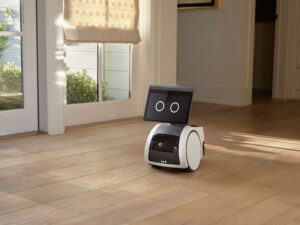Remember The Jetsons?
I used to watch the reruns as a kid, as did most of America. It’s the story of a typical family in the year 2062 through the eyes of 1962 America.
They get around in a flying car, live in a smart house where even the toothbrush is autonomous and are served by their robot maid Rosie. They even chat on something that resembles FaceTime or Skype!
I was thinking about this as Amazon announced its new Astro home robot. Astro, of course, was the name of the Jetsons’ dog. It’s not a coincidence.

Courtesy of Amazon.
Astro is about the size of a small vacuum cleaner and has an iPad-sized screen for a “face.” It’s essentially Amazon’s Alexa assistant in a mobile body that can actively roam around your house.
Astro retails for $1,500, which is roughly the price of a new Apple MacBook Pro and not much more than a top-of-the-line iPhone.
Amazon Wants to Make Your Home Smarter
Astro won’t make my Christmas list. I have enough gadgets floating around my house as is.
But you can see the utility here. If you’re worried about a pet or even an elderly relative being home alone, this is a convenient way to check on them. In another iteration or two, who knows, Astro might be a viable babysitter or caregiver.
This isn’t Amazon’s only venture into the home of the future. The company already sells smart mesh Wi-Fi systems, smart thermostats and even smart video doorbells. And Amazon recently launched its Ring Always Home Cam, a flying drone that patrols your house like a security guard.
Some of this stuff might seem a little far-fetched. I don’t know that I want a drone buzzing around my house while I’m away, and I don’t want it whacking me in the head if I get up at night for a glass of water.
But why wouldn’t I want an affordable smart doorbell that keeps an eye on who’s in front of my house? And why wouldn’t I want a smart thermostat that keeps my house at just the right temperature and keeps my electric bill low?
This isn’t the future. It’s now. And it’s being led by the biggest companies in the world in Apple, Amazon and Alphabet (Google). When Big Tech goes in big, it goes in big.
Semiconductors Power the Home of the Future
The smart home market was valued at just shy of $80 billion last year, and it’s projected to be well over $300 billion by 2026, according to . That’s a lot of investment going into new gadgets and appliances. And it’s just getting started.
If there’s one underlying theme in this rise of the smart home, it would be this: Demand for semiconductors is only going to increase.
Already, it feels like chips go into “everything.” And indeed, the shortage in semiconductors coming out of Asia has wreaked havoc on the production of everything from new cars to smartphones.
But with semiconductors now going into things as mundane as hot water heaters and doorbells, producers will struggle to keep up. Taiwan Semiconductor plans to invest $100 billion in new production in the coming years. And that’s just one chipmaker.
This is a trend with room to run. But it’s not the chipmakers themselves I’m betting on.
In Green Zone Fortunes, I recently recommended a company that supplies the chipmakers. The underlying mega trend is in place, and by focusing on the suppliers, my readers stand to win no matter which chipmaker ultimately comes out on top.
To find out how you can invest in this mega trend, along with another technology that I believe has the potential to be bigger than buying internet stocks in the ‘90s, click here to watch my “Imperium” presentation now.
To good profits,

Adam O’Dell
Chief investment strategist, Money & Markets




